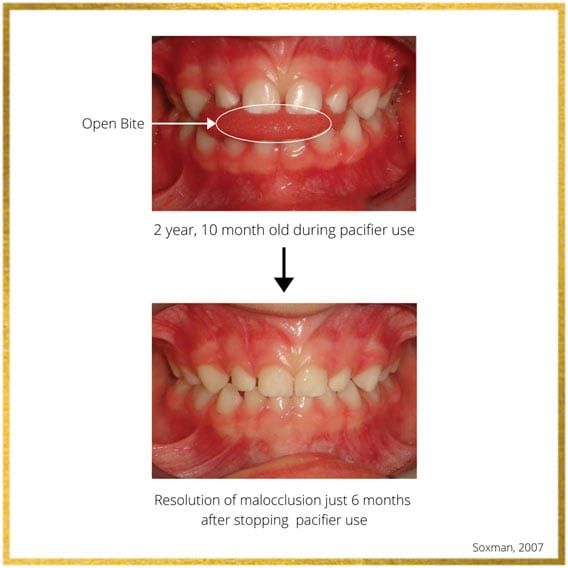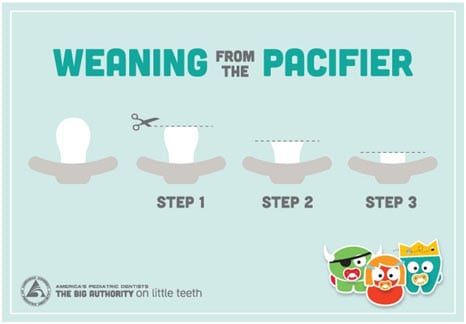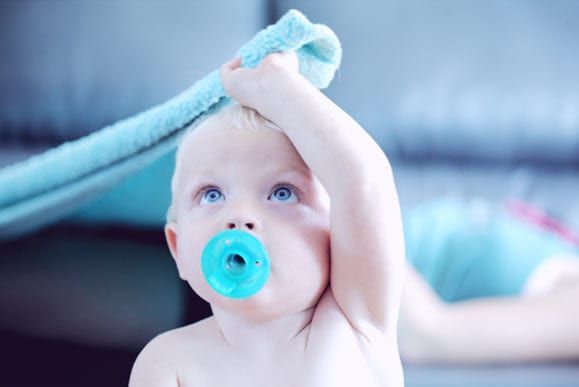Oh, Pacifiers: to love or to hate them? Should you give them to your baby? When should your little one stop using them? Will a pacifier harm their teeth? Here’s what you should know about pacifiers and your baby’s teeth.
When should your baby stop using a pacifier?
Early on, the pacifier nurtures your baby’s natural sucking reflex, which provides a sense of comfort and security. However, continued use can have negative effects on your baby’s oral development. At what point is pacifier use considered prolonged?
Pediatricians recommend using pacifiers for the first six months at nap times to help reduce the risk of SIDS (sudden infant death syndrome) and weaning thereafter due to the correlation with middle ear infections. Pediatric dentists recommend ceasing pacifier use as early as possible so as not to impede correct swallowing patterns and tongue position, which guides the growth of the jaws. It’s also important to consider that early weaning, when your child is less emotionally attached to their pacifier, can make the final separation from their binky much easier.
That being said, we understand it’s not always so simple. Raising a child is filled with its battles and you have to pick them carefully. As a result, many children keep their pacis well into their twos. Fortunately, most little ones will stop on their own between the ages of two and four. Once they begin preschool, the peer pressure can be a strong motivator to break the habit. And if not, we have ways to help! Gentle motivational strategies are your best bet, some of which are listed later in this post.
What are the dental effects of the pacifier?
Extended pacifier use can cause the top front teeth to protrude and tip forward. It can also cause an “open bite”, which is when the child bites down and the top and bottom teeth in the front don’t touch. Luckily, most malocclusions caused by a pacifier habit naturally resolve on their own without intervention if the pacifier is taken away by age two and a half to three.

If the pacifier habit continues, lasting orthodontic issues are more likely and treatment may be necessary to repair the tooth and jaw discrepancies.
Tips for breaking the pacifier habit:
- Broken binkies– when you snip the tip of a pacifier, your child can no longer create suction in their mouth, which changes the experience and the feel of the pacifier. As a result, your little one may become less interested in sucking on these broken binkies and may come to terms with the fact that these pacis no longer work and it’s time to move on.

- Take advantage of a change of pace – kids are creatures of habit. They eat, sleep and play on a schedule and so like clockwork, when they get tired, they reach for that pacifier. However, family vacations or a sleepover with grandma and grandpa offer natural breaks in the routine. Why not take advantage of these times and switch up one more variable – the pacifier. Some kids may not even notice they are without it because everything is a just little different. If they make it two or three nights without it, they may never look back!
- Paci Fairy – If you kiddo is old enough to appreciate the idea of a magical creature coming to collect their paci in exchange for a toy or treat, this can be a great technique to encourage them to surrender their binky. Add a special touch by writing a thank you letter from the paci fairy that praises your little one’s maturity and bravery for giving their paci away.
- “Gifting” the pacifierto new babies – If there is a new baby in the family or neighborhood, some children will feel empowered by the concept of “gifting” their pacifiers to the brand new baby in town. With this strategy, you are simultaneously teaching your little one about sharing and giving as they learn to be proud of the big kid they are becoming.
- Cold turkey – When opting for the cold turkey method, first have a chat with your child about how it’s time to break the habit and why it’s important to stop. After talking with your little one and letting them know the binky will be going away, you can try to eliminate it cold turkey. This method may seem harsh but it’s effective in many cases. We recommend planning for a few days of compromised sleep as your child struggles to adapt to sleeping without their pacifier. Most parents say that after about 3 days, their child no longer asks for their paci.
- Enlist the help of a pediatric dentist – Some kids love to follow rules and will readily give up their pacifier when the dentist says it’s time. It could also be the prizes and certificates we promise at their next visit if they stop the habit!
If you have any questions or concerns regarding your child’s pacifier habit, we are here for you! Schedule an appointment at Sunshine Smiles so we can team up to keep your child’s teeth healthy!



